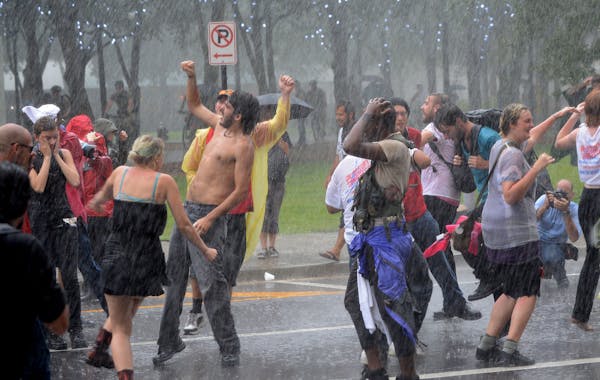TAMPA, FLA. - Former President George W. Bush and Vice President Dick Cheney are skipping the Republican National Convention, and Sarah Palin will get nowhere near the podium that she electrified four years ago in St. Paul.
In the first national GOP assembly since U.S. Rep. Michele Bachmann and her Tea Party allies emerged from the ashes of the Republicans' loss to Barack Obama in 2008, signs of fresh growth are everywhere around the convention hall.
Amid the party faithful arriving for the storm-delayed gathering on Tuesday are Tea Party activists in tri-cornered hats and placard-waving followers of Rep. Ron Paul, the libertarian from Texas who still controls several hundred delegates, including a majority of the Minnesota contingent, many here for their first convention.
But to really appreciate what's new about the GOP in 2012, conservatives say just look at Mitt Romney's running mate, Wisconsin Rep. Paul Ryan, author of a budget document radically cutting government spending and reordering such entitlements as Medicare.
"Paul Ryan is in many ways the manifestation [of the new blood]," said Minnesota Army veteran Pete Hegseth, a political newcomer who mounted a brief race for the Senate this year.
"Four years ago, you might not have seen that as adamantly, because everyone was scared of the political nature of that debate," Hegseth said. "The right, conservatives and Republicans, are now emboldened to have a debate about the big ideas."
GOP leaders have largely assimilated the small-government ethic of the Tea Party, which burst onto the national scene in 2009, during the height of the financial crisis and the debate over President Obama's health care bill. "They've always argued philosophically that they stood for limited government," said former Minnesota Rep. Vin Weber, now an adviser to the Romney campaign. "But in truth, that phrase hasn't had a lot of meaning in a long time."
'Victory lap'
Bachmann, a congressional Tea Party caucus founder, saw her presidential ambitions wither amid a growing string of controversial pronouncements. Her public speaking role in Tampa is limited to a pre-convention Tea Party rally and other venues outside the convention hall.
"One pejorative term after another is hurled after people who consider themselves Tea Party [and] Ron Paul," she told a breakfast meeting of Minnesota delegates on Monday. But, she noted, the two groups have made their mark on the GOP platform this year, championing small government and traditional moral values.
"That never would have happened without your involvement," she told the delegates. "Take a victory lap. We're so much farther than we were before."
If Bachmann won't make it to the main GOP podium, other popular Tea Party figures will, including Florida Sen. Marco Rubio and Kentucky Sen. Rand Paul, the compromise choice over his father, who has pointedly refused to endorse Romney.
"I see this as a triumphant convention," said Sal Russo, chief political strategist for the Tea Party Express. "It's totally different than 2008, which was cautious, 'Don't rock the boat.' Now we've gotten to the point where you can't find a Republican who will say, 'let's create a couple more government agencies or federal programs.' "
Some people say it took controversial figures such as Bachmann to help pull the party to the right; others say she merely tapped into an undercurrent that was already there.
Either way, Bachmann's brand of religious right values, while enshrined in the GOP platform, isn't getting the spotlight in this GOP gathering. Rather, it is the economy, the ground on which Romney plans to wage his fall campaign.
It is also the ground that unites all the factions in the new GOP coalition. "I think we represent that this is a growing party," said Marianne Stebbins, the leader of the Minnesota delegation, which is mostly committed to Paul. "The umbrella is growing."
Back of the arena
For some, the umbrella is still not large enough. Paul activists, who term themselves "Liberty Republicans," are furious about new rules changes that will make it harder for them to amass delegates in future elections, and they're little mollified that their leader's son, Rand Paul, will get to address the convention instead of his father.
Eric Goodrich, an Eagan delegate supporting Ron Paul, said he relishes the independent spirit the movement has brought to the GOP. But he resents the convention organizers' efforts to quash their involvement and the move to jettison Paul-supporting delegates to the back of the convention hall, away from easy view of the cameras. "It's insane, and it's not a fair and open process," said Goodrich, a 37-year-old restaurant manager.
Still, Goodrich said, they are determined to make a mark on the convention and let Republicans of all stripes know that the Ron Paul movement is only getting stronger. He said they believe they can bring about change from inside the party, without blowing it up, but with a steady and firm hand to guide it toward Paul's ideals.
"We are here for a reason," he said. "We are about a revolution in ideas and ideology. That's what I came here to do."
But Obamaism -- defined in the convention hall as big government, big spending and big deficits -- provides the unifying principle of a convention that is likely to be one of the most raucous GOP conventions in modern history.
"The overwhelming number of people I talk to around the country, and from our own delegation, are focused on replacing the current occupant of the White House," said Minnesota GOP Party Chair Pat Shortridge. "I expect there will be overwhelming unity and a sense of purpose in what we need to do."
